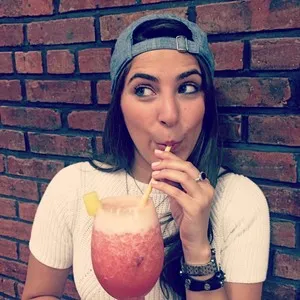Celiac Disease used to be my defining trait after my diagnosis way back in 2008, the days when no one knew what gluten was. Gluten became an easy way to remember who I was (other than my Jewfro, #tbt to high school days), and food quickly became my go-to conversation starter. I was the gluten free girl, and I kinda dug it. I was still finding who I was at the time, so having something that set me apart in a sea of average, normal, homogenous people (#suburbanlyfe) made me happy.
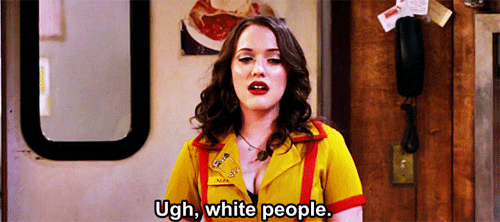
Gif courtesy of getoffmyinternets.net
But what’s funny about it is that I hated the gluten free food I was eating. Grilled chicken, roasted veggies, and poop-tasting bread (way before gf products became mainstream) left me feeling hungry, depressed and skinny.
The Diagnosis
Food used to be in the background for me. I never really cared what I put in my mouth, as long as it was carboloaded and 5-year-old approved. Yes, I was a picky eater, but I didn’t really give a shit about the quality of my food. French fries, bagels, pasta, chicken fingers, rice — you get it.
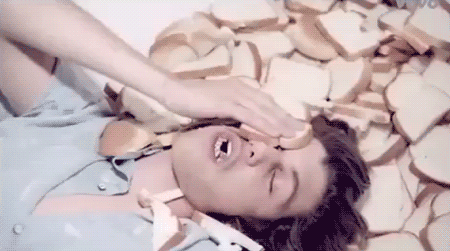
Gif courtesy of awesome-blog-pics.tumblr.com
But in high school weird things started happening to me. I lost my period, my hair thinned out and became super dry, I was borderline anemic, and would literally nap every damn day in 8th period English because I couldn’t keep my eyes open.
Were my chicken fingers finally catching up to me? Kind of.
My poor pediatric gastroenteroligist, Dr. Amy DeFelice (hey, girl) at the Celiac Disease Center at Columbia University, broke the news that I had Celiac in October 2008. I couldn’t look her in the eyes. She tried making food recommendations, like rolling potato chips into my plain sliced turkey when I went out for lunch with my friends during high school. I shot her down. Hard. #sry
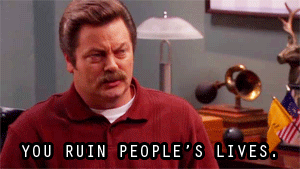
Gif courtesy of giphy.com
So here’s the deal: Celiac is an autoimmune disorder in which the small intestine recognizes even the most microscopic amount of gluten as toxic. As a result, when Celiacs eat gluten they become malnourished and a slew of issues can spring up. So yeah, gluten had to go.
The year after my diagnosis I lost about 15 pounds. I lost my bloat, my love handles, and some of my baby fat (although I still kind of have baby cheeks, I’ll let you know the day I don’t get carded). I had tons of energy, I stopped being a bitch (bye, cranky Felicia), my body went back to equilibrium, and my perpetual brain fog disappeared.
I was #eatingclean, but I was miserable. I was medically cured, but emotionally I was bogged down.
RIP to the life I knew, and a big unhappy welcome to the Celiac lifestyle.
Early Impact
With my diagnosis, I went from not giving a shit about what I ate to suddenly not being able to function without obsessing over food: what I was eating, where I was eating, how to order what I was eating, when I was eating, how to explain why I wasn’t eating what everyone else was eating. No one understood it, and I felt like no one understood me, even others with Celiac.
Sounds kind of silly now in a world where Celiacs, gluten intolerants, vegans, vegetarians, nut allergies, etc. are the norm. But at the time having a food allergy, restriction or special diet was seriously weird. I was a leper in a world full of gluten and ignorant people. Not ignorant because they weren’t educated, but ignorant because the world just didn’t know about Celiac or gluten free at the time. And to a certain level, they still don’t.
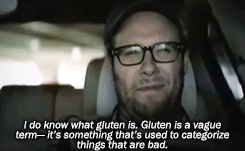
Gif courtesy of giphy.com
So when I was thrown into a world that didn’t accept my disorder, I was on my own to fend for myself, and it was exhausting. Packing snacks for school, having to go home for lunch, not eating out with friends, not knowing what I could or couldn’t drink at a house party, having to eat before sweet sixteens, always having food in my purse — avoiding gluten consumed me. Celiac consumed me. Food consumed me. And I hated it.
Social Pressure
And the worst part of all was the social aspect. At the time, I would have to describe Celiac to restaurants as a severe, severe, SEVERE allergy to wheat and flour (which isn’t really true, gluten is also in rye, barley, oats, malt, and a lot of other shit), to the point where they’d even be nervous to serve me. No, I wasn’t crazy. No, I’m not some paranoid, entitled Jewish girl from Long Island who likes to make a scene wherever I go. In fact, I’m the opposite.
Lots of times I would call ahead if I was going out with a group of friends to a) make sure there was even something for me to eat, and b) ask all the proper questions beforehand so I wouldn’t have to quiz the server in front of a large group. If the answer wasn’t what I needed to hear, I would just eat before I went out with friends and then sit there like an idiot, watching them down food that I wish I could be eating. And if I had to ask the gluten questions at the table, I’d underplay the severity of Celiac so I wouldn’t look crazy, but then I would risk contamination. Dumb, but I felt so extremely embarrassed of my disease. It sucked. It still sucks. It will always suck.
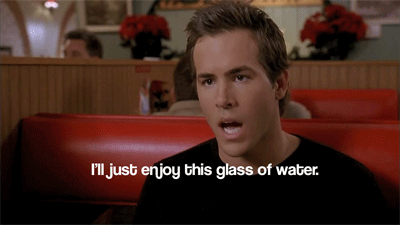
Gif courtesy of livingtheglutenfreedream.tumblr.com
And it’s more than just having a gluten free option available. It’s the preparation. Celebrities and people who choose to be gluten free for fun or to lose weight make eating out that much more difficult for Celiacs. Many restaurants will put bread on their grill so I can’t eat grilled meat or fish. Others will boil their gluten free pasta in the same water as their regular pasta. Some lie about frying gluten in their fryer, leading to hours in the bathroom, headaches, stomach aches, and my old school bitchy attitude to come out with a vengeance.
And don’t even get me started on dating. It’s awkward to say the least. Like, no, I can’t kiss you if you just downed a beer. I can’t share my drink with you if you’re eating fried chips at the bar. Hm, that place you chose for dinner isn’t gonna work from me… I’m terrified of coming off as that entitled, high maintenance chick who can’t hang or go with the flow, but it’s not my fault.
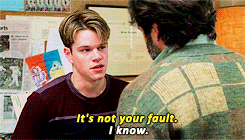
Gif courtesy of rebloggy.com
The whole cross contamination thang is a pretty tough concept for people to wrap their heads around. And even if they do get it, it’s never top of mind. But for me, watching someone contaminate a fresh jar of peanut butter by double dipping after spreading their toast causes such internal anxiety and angst. Why did you do that? WHY?
I obsessively watch food preparation and spreads — not because I like food, but because I have to know whether I can eat or not. Doesn’t matter if I have any type of appetite, I need to know from the start whether food is safe, just in case I want to eat later. Like I said, food is always on my mind, even when I don’t want it to be.
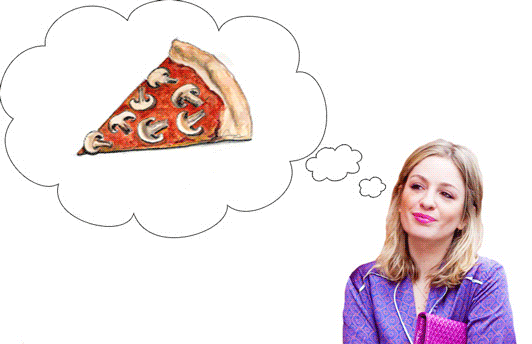
Gif courtesy of thenotvanilla.com
#RealLife Struggles
If we ever found a gluten free restaurant, which was v random back in the day, we would go as a family and order every damn thing on the menu. My parents felt so badly for my sister and me (yes, Celiac is genetic and my best friend/older sister was diagnosed 2 years before I was), that they would want us to indulge in as many gluttonous (no, not glutenous), carby foods as we could.
I’m talking mozzarella sticks, pizza, pasta, chicken cutlet, bread and more, all at the same meal. We would have to be rolled out of the restaurant, food piled to the top of our esophaguses, just hoping to be vomited out. We didn’t though, don’t worry.
And so began this ebb and flow of food. I would be hungry all day every day, filling myself up on Boar’s Head turkey, organic gluten free cereal, and roasted veggies, then when the time came and the options presented themselves, I’d binge on fattening gluten free food. There was something about the supply and demand that implored me to always indulge.
The fact that good gluten free food was pretty scarce made it that much more valuable when it existed. How could I not order gluten free pancakes over eggs when they were calling my name on the menu? How could I not eat an entire gluten free pizza pie and bread basket when I hadn’t eaten carbs in 2 days? When would I have the opportunity to eat homemade gluten free cookies again if I didn’t eat them right then and there?
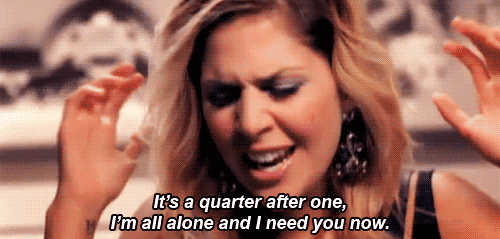
Gif courtesy of tumblr.com
As time passed, gluten free options became more and more available, increasing the times I’d binge on fattening meals. Passing them up seemed, and still seems, silly. Gluten free fries in a separate fryer are rare, so yes, I will — to this day — continue to eat the entire basket on principle.
Emotionz
Healthy eating is tough. A lot of annoying girls probably think that I’m sooooo lucky for being gluten free — I don’t have the option to order late night drunk Domino’s, and I have to eat a salad at a restaurant when there are no other options — #skinny, amirite? No, you dumb betch. If I call a restaurant and ask what’s gluten free on the menu and they say salad, I peace on the spot and give them some severe attitude.
However, if I’m in a group situation and whoever picked the restaurant didn’t know all I can eat is a salad, I’ll shut down. I’ll pick at my sad little lettuce leaves, half participate in conversations around me, but ultimately keep to myself, suffering in silence. I lie and say the salad’s great, act like I’m fine, but inside I’m fuming about how these assholes can’t offer anything gluten free in this day and age. Then I’ll go home and stuff my face with fattening food because I had to suffer for hours. I earned it.
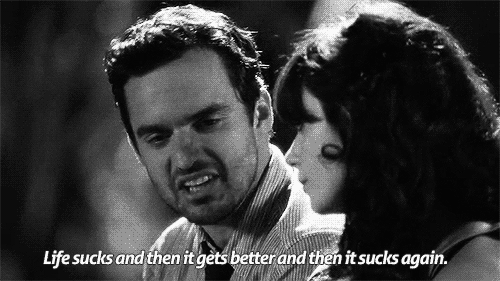
Gif courtesy of tvrecappersanonymous.wordpress.com
That’s another issue — sometimes I eat even when I’m not remotely hungry just because I know there won’t be gluten free or uncontaminated food available for me in a few hours, minutes or even seconds.
I always have to take food first at buffets or family meals, which I hate doing. I feel like it’s rude of me, but medically I have to. And that causes taking a lottt of food on my plate because I won’t be able to take any after everyone else serves themselves with bread on their plate. That leads to eating everything on my plate due to the same thought process — when’s the next time I’m gonna eat something?
As a result, I eat when I’m not hungry, I indulge when I’m not hungry, and I think about food when I’m not hungry. I can’t escape it. Gluten is not only toxic to my body, but to my mind as well. It’s caused an unhealthy relationship with food, even though avoiding it is the only thing keeping me healthy. It’s mind blowing, to be honest. And it blows. A lot.
No eating situation is easy, unless I’m at a restaurant that 100% understands Celiac, or at someone’s house who knows a friend or family member with Celiac. Otherwise it includes constant explaining, pity stares, confusion, or sheer disregard for the disease. You know who you are.
And Now?
I’ve actually learned to be extremely outspoken, despite the impending embarrassment I used to feel way back when. The personal struggle has evolved quite a bit since I was 16. It used to define me and would probably be the first fact out of my mouth when I was talking to someone. Now, I don’t even mention it unless it comes up organically (ex: at a restaurant).
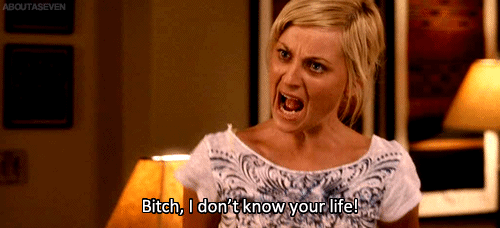
Gif courtesy of sharegif.com
I used to stress about eating out with friends. Now I don’t even call restaurants and just order whatever I can have because I’d rather be social than hang all by my lonesome. I used to be afraid to speak up for myself and let Celiac define my entire being. Now I’m pretty damn outspoken and let my personality be my defining trait (#5oclockfridays, hayyy).
But the food obsession continues. I’ve been gluten free for 7 years this October, and food still defines my day to day life. It’s a lot easier than it used to be, but look where I work — a publication that focuses on food. How did I get involved? Celiac caused a daily revolution around food, so I now have a job that lets me talk, think, and interact with food all day. It actually feels pretty nice to be able to focus my waking minutes on food without feeling extreme cognitive dissonance, but it’s open my mind to a lot of other thoughts. Even to the fact that I have an unhealthy relationship and resentment towards food and my dietary restriction.
But I’m becoming a lot more comfortable with it. And gluten, you are my bitch.
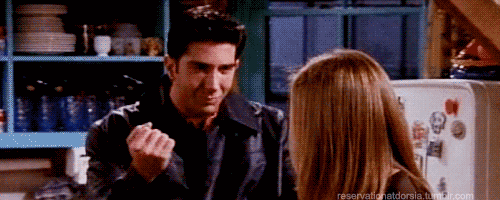
Gif courtesy of gifrific.com


